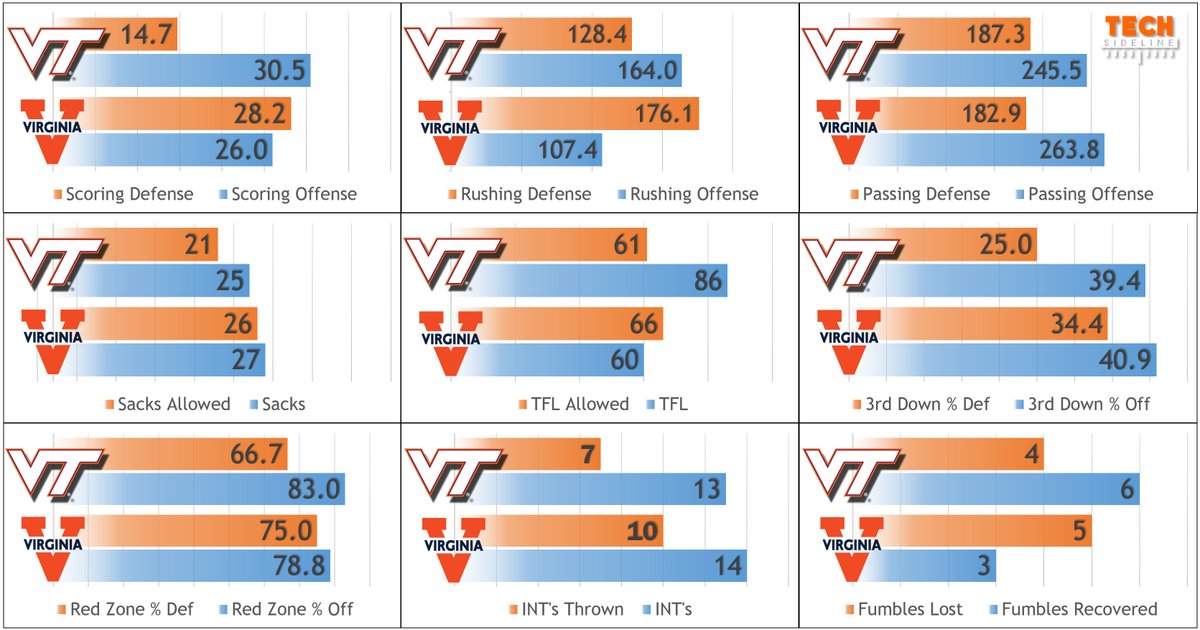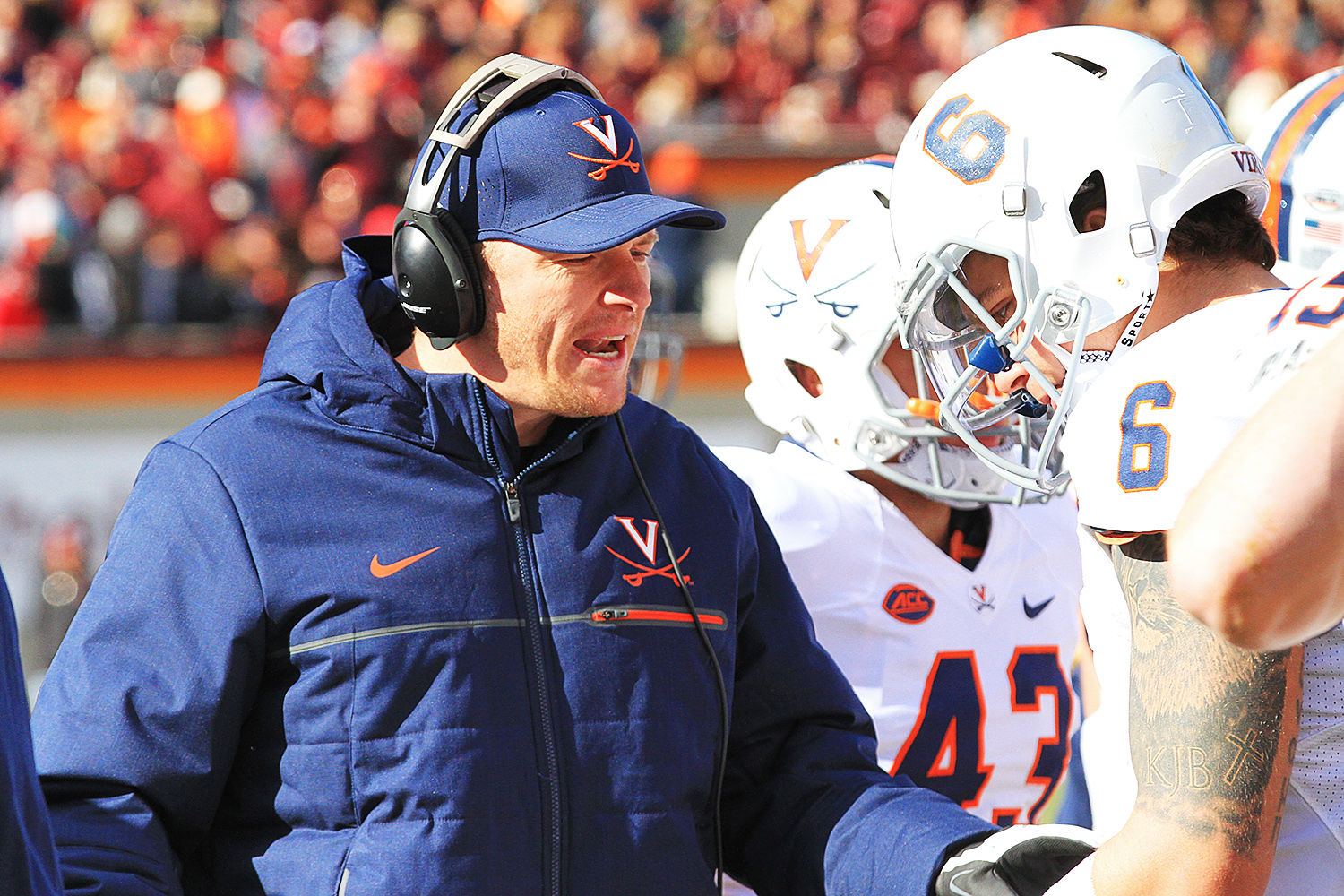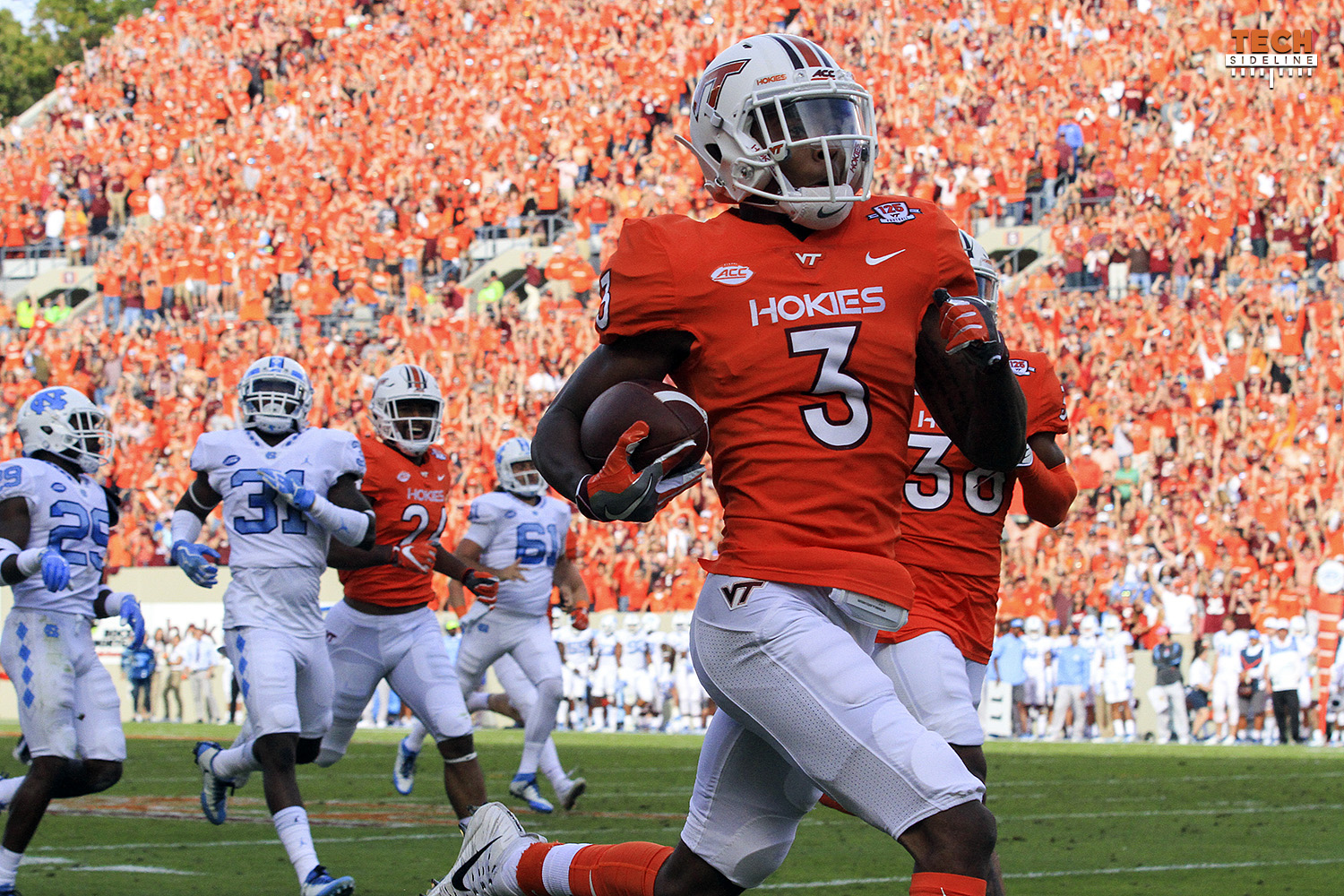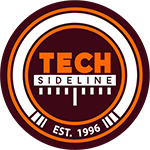Sponsored by the Drive for 25: The Hokie Club’s Drive for 25 campaign is a paid sponsor of TechSideline.com. As part of that sponsorship, we’ll be bringing you monthly updates and articles about the Hokie Club and the Drive for 25. To learn more about the Drive for 25, click here.
- Virginia Tech-UVA rostercard: Click here
- Game notes from Hokiesports: Click here
- Charlottesville, VA Weather: Click here
- Gameday information: Click here
Virginia Tech has won 13 straight games over in-state rival UVA, and the No. 24 Hokies (8-3, 4-3) will be looking to make it 14 when they visit the Hoos (6-5, 3-4) on Friday night at 8pm on ESPN.
UVA is bowl eligible for the first time since the 2011 season. After a tough 2-10 start to the Bronco Mendenhall era, the second year head coach has a much better team this year, led by senior quarterback Kurt Benkert, who will likely be on an NFL roster at this time next season. The Hoos started 5-1, and though they’ve faded down the stretch and lost four of their last five games, they have a lot to be proud of this season.
Virginia Tech is 8-3, with two of their three losses coming to the No. 2 and No. 3 ranked teams in the country. The Hokies are beat up on both sides of the ball. Quarterback Josh Jackson isn’t 100%, at least half of the running back corps isn’t healthy, and the defense has lost two key starters (FS Terrell Edmunds and DE Vinny Mihota) for the season in the last two weeks. The Hokies are running on fumes, and they beat Pitt last week on sheer effort and determination. This is a much different team than it was early in the season.
Can UVA finally beat the Hokies? Let’s take a look at some key aspects of this game. First, some statistical comparisons from OXVT.

No Mobile QB: Advantage Hokies
Virginia Tech is 18-7 through the first 25 games of the Justin Fuente era. The seven losses all have one thing in common: mobile quarterbacks.
Take a look at the opponent quarterback rushing totals in Tech’s seven losses since the start of the 2016 season, going backwards chronologically.
Georgia Tech 2017: 22 carries, 64 yards
Miami 2017: 13 carries, 84 yards
Clemson 2017: 19 carries, 94 yards
Clemson 2016: 17 carries, 85 yards
Georgia Tech 2016: 32 carries, 121 yards
Syracuse 2016: 24 carries, 106 yards
Tennessee 2016: 14 carries 106 yards
Average: 20.1 carries, 94.3 yards
 It’s safe to say that running quarterbacks have given the Hokies trouble. Tech plays a lot of man coverage, which gives opposing quarterbacks running room when they escape pressure, but the majority of those yards were racked up via the read option or designed quarterback run. The last team to beat Virginia Tech without a quarterback who could play a heavy role in the running game was Miami back on October 17, 2015, 30-20 in Miami. And even that took backup quarterback Brenden Motley turning the football over three times.
It’s safe to say that running quarterbacks have given the Hokies trouble. Tech plays a lot of man coverage, which gives opposing quarterbacks running room when they escape pressure, but the majority of those yards were racked up via the read option or designed quarterback run. The last team to beat Virginia Tech without a quarterback who could play a heavy role in the running game was Miami back on October 17, 2015, 30-20 in Miami. And even that took backup quarterback Brenden Motley turning the football over three times.
If I’m an opposing offensive coordinator, the first thing I would do when designing my game plan would be to decide how and when I want to use my quarterback on the ground, and what type of plays I’d use. That is, if I had a mobile quarterback.
Fortunately for the Hokies, Kurt Benkert (6-4, 215, Sr.) is not what anybody would consider a mobile quarterback. He has -53 yards rushing on the season. He’s lost 172 yards on 26 sacks. His 29 non-sack runs have been solid enough, gaining 116 yards for an average of four yards per carry. Perhaps a few of those were scrambles, but even if they were all designed runs, that means the UVA offensive staff has asked him to carry the football fewer than three times per game. There just isn’t any confidence in his running ability.
It was the same thing last year for Benkert, who had minus-94 yards on 60 carries. He had only 29 non-sack carries in 12 games, and averaged 3.9 yards on those carries. These days, if you have a mobile quarterback, any offensive coordinator worth his salt will use his running ability. UVA isn’t using Benkert in the ground game for a reason.
That’s good news for Virginia Tech. If UVA manages to beat the Hokies on Friday, they’ll have done something that zero teams have been able to do for the last 26 months…beat Virginia Tech without a running quarterback.
One thing to note: Benkert has fumbled 10 times this season, but opponents have recovered just two of them. UVA has fumbled 19 times, and recovered all but five of them. Contrast that to Tech’s 2016 season in which the Hokies fumbled 10 times in their first two games, and opponents recovered nine of them. There’s a measure of luck involved when it comes to fumbles.
Outside Coverage: The Other Virginia Tech Advantage
The Hokies are No. 129 in the country in IsoPP pass defense, which means they are one of the worst teams in the country in allowing big plays through the air. However, the vast majority of those plays have come over the middle, as Virginia Tech’s cornerbacks have enjoyed an outstanding season.
Both Brandon Facyson and Greg Stroman have recorded just 16 tackles each on the season. That wouldn’t be good if they were linemen, safeties, or linebackers. However, that’s great for cornerbacks. Those guys just aren’t allowing very many completions this year.
Stroman in particular has been dominant. Opposing quarterbacks have a passer rating of 39.8 when targeting Stroman this season, which is the best mark in the country. As a comparison, BC freshman QB Anthony Brown ranks No. 100 nationally in pass efficiency (the lowest rated player on CFBStats.com), and even his rating is at 103.53. That’s not very good. Imagine if he were throwing at Greg Stroman on every single play.
Kurt Benkert has had a great season as UVA’s starting quarterback. He’s completed 60.4% of his passes for 2,876 yards, with 25 touchdowns and just eight interceptions. He’s projected as a mid-round pick in May’s NFL Draft. However, Friday will probably be his toughest matchup of the season. It’s been easy to nitpick some of the big plays the Hokies have allowed this season, but only three of Tech’s 11 opponents have managed to complete over 50% of their passes this season: West Virginia, Clemson, and Pitt.

It’s likely that Benkert will find the going a little tougher on the outside against Tech’s cornerbacks, who have both had very good seasons.
Over the Middle: Advantage, Hoos
Tech has done a very good job stopping the run this season, and their cornerback play has been outstanding. Where the Hokies have been hurt, however, is over the middle. Terrell Edmunds played hurt all year, though we didn’t know it until this time last week, and now he is done for the season. Divine Deablo, who played a lot early, was lost in the Old Dominion game.
Mook Reynolds, who moved to free safety last week, has apparently also been playing a bit banged up, and he was knocked out late in the game against Pitt. When Khalil Ladler played on that goal line stand, he was the fourth Virginia Tech player to line up at free safety this season.
If Reynolds can’t play on Friday, Ladler will get the start. If that’s the case, in effect the Hokies will be playing their fourth option at free safety. The redshirt-freshman has been good in his run fits in limited action, and he looks like a very physical player despite his listed size of 5-11, 180. What we don’t know is whether or not he’s ready to get the defense lined up, and how well he’ll hold up in coverage down the field
When Mook Reynolds moved to safety, Deon Newsome replaced him at the whip/nickel position. Mook’s best attribute as a football player is his ability to tackle in space around or within five yards of the line of scrimmage (or behind the line of scrimmage, as he has nine tackles for loss this season). Last week against Pitt, we saw Newsome miss two such tackles on Pitt’s first touchdown drive (and the only touchdown that should have counted, if we’re being honest). They came on back-to-back plays in space, and the last one went for a touchdown.
To be fair to Newsome, it was his first extended playing time on defense, and he seemed to do fine the remainder of the game. However, we can expect the UVA offense to target the wide side of the field, where they’ll likely see Newsome at whip/nickel, and a new free safety, be it a banged up Mook Reynolds who is playing a new position, or the redshirt-freshman Ladler.
Working against those guys will be the versatile Olamide Zaccheaus (5-8, 190, Jr.), who is one of the most underrated players most people have never heard of, simply because he plays for a program that hasn’t had success during his career. Zaccheaus is productive in two phases of UVA’s offense…
Passing Game: Zaccheaus leads the team with 76 catches for 794 yards, and he also has five touchdown receptions.
Running Game: Zaccheaus is second on the team with 182 rushing yards on just 27 carries, averaging 6.7 yards per carry.
The Hoos are so depth shy at running back that Zaccheaus’ 27 carries also rank second on the team (not counting Benkert and his 54 “carries.”)
In short, Zaccheaus is a player who could factor in on the wide side of the field against Deon Newsome and either Khalil Ladler or Mook Reynolds, and he could factor in on the passing game, or the running game with jet sweeps. Last year in this matchup, he only had two catches for 49 yards, one of which went for a 39 yard touchdown late in the game, but the situation is much different this year. He’s got a better quarterback throwing him the ball, he’s an older and more experienced player now, and Tech isn’t as strong at whip/nickel and free safety. Keep your eye on No. 4 and how the Hoos use him on Friday night.
The Virginia Defense
Virginia’s defense has been solid this season, ranking well in both traditional stats and the advanced metrics…
Total Defense: No. 33
Rushing Defense: No. 76
Passing Defense: No. 19
Pass Efficiency Defense: No. 39
Scoring Defense: No. 78
S&P+ Defense: No. 49
Success Rate: No. 36
Explosive Plays: No. 83
Finishing Drives: No. 75
The Hoos have been led by their pass defense, though their rushing defense has struggled at times. UVA has allowed 38 points per game over their last five games; however, their defense hasn’t been as bad as that number indicates. They’ve allowed more than 400 yards in just two of those five games. Their defensive field position has been brutal, and there was a punt return for a touchdown and a pair of interception returns for touchdowns mixed in as well.
The Hoos have a very good player at all three levels of the defense…
DE Andrew Brown (6-4, 285, Sr.): 37 tackles, nine TFL, three sacks. Brown is a former highly-ranked recruit who is projected to be drafted in the later rounds as a 3-4 defensive end.
LB Micah Kiser (6-2, 240, Sr.): 115 tackles, eight TFL, five sacks. Kiser is currently projected to a mid-round pick in May.
FS Quin Blanding (6-2, 215, Sr.): 104 tackles, three TFL, four interceptions. Blanding was a 5-star recruit, and though he won’t be a first round pick, he will play on Sundays. He hasn’t played well against the Hokies in the past. We’ll see if that changes on Friday.
Last week, I thought Virginia Tech would have trouble running the football against Pitt. I was wrong. The Tech offensive line played its best game of the season in my opinion, and Deshawn McClease and Jalen Holston made the free hitter miss a few times and broke a few tackles. Collectively, it was probably Tech’s best running back performance of the season.
Tech’s running back rotation has been whittled down by default. Let’s take a closer look…
Travon McMillian: Injured against GT, had only one carry against Pitt because of his injury.
Steven Peoples: Has played in just five games because of an injury.
Jalen Holston: Good first half against Pitt, but injured his knee.
I expect McMillian will be able to play on Friday, but the Peoples and Holston situations are less clear. My best guess as to the running back rotation this week is McMillian and McClease, but at this point it’s anybody’s guess. If the Hokies can run the ball like they did last week, it would be a huge benefit to the offense.
Tech’s passing game got better last week. I think the fact that Phil Patterson is healthy and finally playing helped the offense, and his presence allowed Tech to play Cam Phillips in the slot some, which also helped. Some of the execution problems have to be cleaned up, but the basic concepts of the passing game worked better against Pitt than they had since probably the Boston College game.
However, UVA’s secondary is better than Pitt’s. If Josh Jackson gets healthier then it’s possible that we could see the passing game take another step forward.

Special Teams Comparison
As we all know, Virginia Tech plays some of the best special teams in the country under James Shibest. The Hokies routinely win the field position and hidden yardage battles, and they dominate other teams in terms of punt returns and punt coverage.
Let’s compare Tech’s numbers with those of the Hoos. First, the Hokies…
Field Goal Efficiency: No. 73
Kick Return Efficiency: No. 29
Kickoff Efficiency: No. 40
Punt Return Efficiency: No. 8
Punt Efficiency: No. 37
Difference in Average Starting Field Position: No. 2
Overall Rank: No. 6
Tech is solid across the board, but they’ve been especially efficient in the punting game, and as a result the difference between their own average starting field position and their opponents’ average starting field position is 8.7 yards, which ranks No. 2 in the country.
Here are UVA’s rankings…
Field Goal Efficiency: No. 50
Kick Return Efficiency: No. 12
Kickoff Efficiency: No. 115
Punt Return Efficiency: No. 65
Punt Efficiency: No. 94
Difference in Average Starting Field Position: No. 62
Overall Rank: No. 63
The Hoos are neither bad nor good on special teams, though on of their weaknesses (punt efficiency, No. 94) matches up with Virginia Tech’s biggest strength (punt return efficiency, No. 8). UVA has allowed two punt returns for touchdowns this season, and Greg Stroman has returned two for touchdowns, and nearly a third.
Meanwhile, Daniel Hamm (5-9, 200, Sr.) averages just 4.8 yards per punt return, while opposing teams have returned just 10 punts for a grand total of 42 yards against the Hokies.
Considering those numbers, you have to like Virginia Tech’s chances to win the special teams battle on Friday night, and therefore the field position battle. If Greg Stroman can hit a big return for a touchdown, even better.
The Hokies must watch out for kickoff return man Joe Reed (6-1, 215, So.), who has a kickoff return for a touchdown to his credit this season. However, if Joey Slye is healthy and able to play, it’s very possible that Reed won’t get a chance at a return.
Final Thoughts
Virginia is a much-improved football team, and they surely must see this game as their best opportunity to beat Virginia Tech in a long time. I thought they had a pretty decent chance in 2015 as well, and I picked a close 27-20 Hokie win. It turned out to be 23-20 Hokies, as Joey Slye made a field goal at the end to win.
What I remember about that game is I thought UVA outplayed Tech for most of the game, but when it really counted, the Hokies turned it up a notch and won the game. With the score 20-13 after UVA scored a touchdown with 10:04 remaining, Tech started getting the ball to Isaiah Ford, and just 1:24 later Michael Brewer hit Ford for a 32 yard touchdown pass. Ford had a 38 yard catch to set up his 32 yard touchdown.
After forcing the Hoos to punt, Tech embarked on an 11-play, 56 yard drive that took exactly five minutes off the clock. Ford began the drive with a six yard catch and a 21 yard catch, and then the Hokies started running the ball with Travon McMillian. They were stopped on fourth down, but Joey Slye nailed a 41 yarder to win it. UVA had less than two minutes remaining, and Matt Johns was sacked on the first play, and threw an interception to Chuck Clark on the third.
Point being, when it looked like the Hoos were finally going to beat the Hokies, Virginia Tech turned it up a notch and dominated the fourth quarter. Tech’s best offensive players that year were Isaiah Ford, Travon McMillian and Michael Brewer, and when those guys started turning it on, UVA didn’t seem to have a chance.
It was sort of the same way in 2012. I’ll spare you the details because this article is getting too long, but UVA held a 14-7 second half lead, but the Hokies outgained the Hoos 182 to 13 down the stretch, and UVA had the ball for fewer than nine minutes in the entire second half. Again, when things got dicey, the Hokies stepped up their game, and the Hoos wilted under pressure.
On one hand, past meetings mean nothing. That was 2015 and 2012, and this is 2017. We’re talking about a different group of players, and two different coaching staffs. On the other hand, Tech has beaten UVA 13 times in a row. Our players know it, and their players know it. That has to be in the heads of UVA players, and they sure have been anti-clutch against VT in the last two close games.
I’m banking on a couple of things in this one…
1: The fact that no non-running quarterback has beaten Virginia Tech since October of 2015.
2: The opinion that Tech’s cornerbacks will lock down the outside, and the Hokies will stop the running game, leaving Virginia with just one offensive option…over the middle. They might and probably will hit a big play or two, but because it will be tough sledding with the outside passing game and the running game, their offense won’t be able to consistently perform.
Combine that with Virginia Tech’s special teams advantage, and I’m picking the Hokies. I’m expecting a good game.
Prediction: Virginia Tech 24, UVA 20
Will Stewart’s Take: Okay, Virginia, this is your chance. You’re going up against a Virginia Tech defense that has lost a starting defensive end (Vinny Mihota), and the other (Trevon Hill) is playing on one leg due to a hamstring injury. The free safety and whip/nickel positions are in a state of flux due to injuries as well.
On the other side of the ball, the Hokie tailback position is thinned out, and their quarterback is playing hurt and his production is dropping. Josh Jackson fell below 60 percent for the season for the first time after last week’s game, and in his last four games, he only has two touchdown passes and three interceptions.
You’ve got a pretty good quarterback in Kurt Benkert, and a dynamic player in Olamide Zaccheaus. You’ve got a receiver, Andrew Levrone, who is averaging over 20 yards a catch. Defensively, you have a good/great senior player at every level: Andrew Brown at defensive end, Micah Kiser (the ACC’s leading tackler) at linebacker, and Quin Blanding (the ACC’s third-leading tackler) at free safety.
Just like in 2003, the last time you beat Virginia Tech, you’ve got a more productive quarterback, some NFL guys on your roster, and you’re going up against a Hokie team that is battling just to make it to the finish line. Really, this is your chance to push the reset button on this annoying (to you) Twitter account:
Virginia Tech has held the Commonwealth Cup for 4742 days. #Hokies
— Commonwealth Cup (@CommonwlthCup) November 21, 2017
Will’s Prediction: Virginia Tech 24, Virginia 23
Ricky LaBlue’s Take: There have been several instances in recent seasons where you could logically draw this conclusion — Virginia Tech might finally lose to Virginia.
However, each of those times, Virginia Tech didn’t lose to Virginia. Not in 2011, when the two teams were fighting for a Coastal Division title. And not any year after that. In fact, not only have the Hokies won this game 13 straight times, they’ve won 17 of the last 18 contests.
I was born in 1994. I am 23 years old. Since I’ve been alive, Virginia has beaten Virginia Tech just four times. Let than sink in.
As bad as things have been for Virginia Tech since the turn of the month, and as decent as Virginia has looked this season, I’m finding it difficult to pull the trigger and pick the ‘Hoos. It’s just hard to envision.
Sure, Virginia Tech has given up a ton of big plays this season, and sure, that’s how Virginia scores their points. But, the ‘Hoos are giving up a lot of points recently, and Virginia has lost four of their last five games. They’re already bowl eligible, so they don’t even need to fight for that anymore.
It will be a close game, and the outcome will be in doubt for a good portion of the game. But, Virginia Tech will win this game. In my eyes, the offense is close to turning a corner, and the ‘Hoos don’t exactly own a lot of momentum heading into this prime time matchup. Give me the Hokies.
Ricky’s Prediction: Virginia Tech 24, Virginia 21
[yop_poll id=”41″]






 Print
Print







uva receives and goes 3 & out. Punt to Greg and takes it to the house. and the rest of the game runs the same course as the unc game. D scores, O scores and SP scores and that is the way things are in the Hokie Nation.
HOKIES WHACK THE ‘hoos!!!
Kiser and Blanding are great players. Watched them all year and they play hard and tough. U.Va. Offense looks better than Pitt, and Duke and at times looks great (like Miami) but generally inconsistent (like Miami earlier in the year). So it’s crucial that Hokies play their best game, and I don’t think they have played their best yet. 28-17 Hokies, feeling strong as long as the DTs are healthy.
Losing Vinny won’t help our pass rush and we need to make Benkert uncomfortable. I am also concerned about our middle coverage, and sometimes our LBs don’t appear to be very good in pass coverage. We’re banged up and missing some needed players, but this is all about pride.
Thanks for another stellar preview article. You guys are on your game.
Thanks. Chris does a great job getting to the heart of the matter.
I don’t see how you say UVA’s QB is going to be in the NFL. I don’t see that he’s better than Evans and look what happened to Evans.
he is a much better pocket passer than JE. That’s what the NFL wants
I have a friend who is a scout and asked him the difference between Benkert and Evans …. he said its night and day …Benkert has a better arm and his 2nd and 3rd reads are better…his knowledge of defenses is better…he said pro teams only look at mobility as a way to buy time for receivers to get open…. although he did say that Evans competitiveness was a positive . He feels that Benkert will be a good backup qb in the NFL which is a huge commodity…..surprised me also .
Game is Friday night, if you go on Saturday you’ll miss the game.
Fixed, thanks.